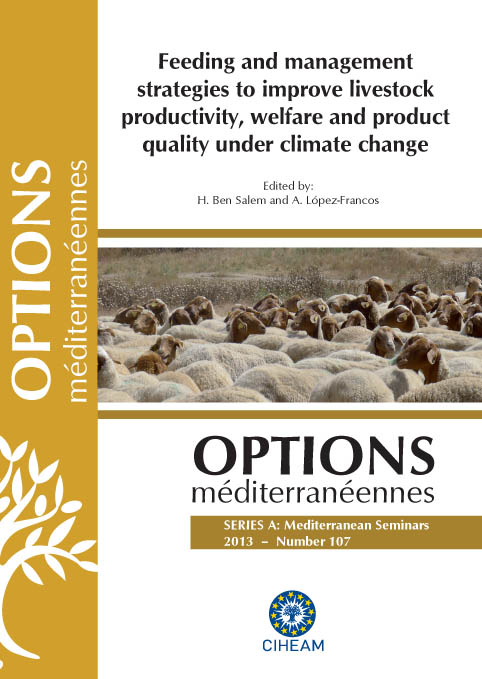| Article précédent | p. 237-240 | Article suivant |
The effect of the incorporation of sorghum in the diet of fattening kids on performances, carcass characteristics and meat quality
The effect of including sorghum in the diet for fattening kids on growth performance, carcass characteristics and meat quality was studied. Three concentrate rations (Rm, R2 and R3) containing respectively 0%, 25% and 50% DM of sorghum grain completed with barley and faba beans, were distributed to 3 groups of 5 local kids for 3 months. The results showed that sorghum had no effect on ADG (47.9, 48.9, 44.5 g/day respectively for Rm, R2 and R3), while the intake and feed conversion showed a significant difference (12.35, 11.65, 13.20 kg DM/kg weight gain (P<0.001).This difference was positive with 25%DM of sorghum. As for carcass characteristics, sorghum had no effect on performance and weight of carcass, pluck, gastric pouch, perirenal and mesenteric fat. Bone tissue was not affected, as the length of the carcass and thigh did not differ significantly. No differences were observed with regards to the muscle tissue because thigh thickness, compactness, conformation and muscle index were similar. Sorghum did not affect carcass color indices. In terms of technological (pH and water retention) and organoleptic (color and tenderness) meat quality traits, no effect of sorghum inclusion was observed. Sorghum incorporation can reach 50% DM of kids concentrate without negatively affecting fattening performance, carcass characteristics and meat quality.
Pour déterminer l’effet de l’incorporation du sorgho grain dans la ration des chevreaux, les performances de croissance, les caractéristiques de la carcasse et la qualité de la viande ont été évaluées. Trois formules de concentré (Rm, R2 et R3) contenant 0%, 25% et 50% MS de sorgho grain associé à l’orge et la féverole, ont été distribuées à 3 lots de 5 chevreaux durant 3 mois. Les résultats montrent que le sorgho n’a pas d’effet sur le gain moyen quotidien (GMQ = 47,9, 48,9 et 44,5 g/jour respectivement pour Rm, R2 et R3. Cependant, la quantité ingérée et l’indice de conversion ont montré une différence significative (12,35, 11,65, 13,20 kg MS/kg gain de poids) (P<0,001). Quant aux caractéristiques de la carcasse, le sorgho n’affecte pas les performances de la carcasse. Les qualités technologique (acidité et taux de rétention d’eau) et organoleptique (couleur et tendreté) de la viande ne sont pas affectées par l’incorporation du sorgho. Le sorgho peut atteindre 50% MS du concentré des chevreaux sans affecter négativement les performances d’engraissement, les caractéristiques de la carcasse et la qualité de la viande.
- [ Afficher ]
- [ Télécharger ]
- [ Exporter la citation ]
Vous pouvez télécharger la citation au format :
- [ Imprimer ]
-
Mots-clés
CARCASSE, CHEVREAU, ENGRAISSEMENT, PERFORMANCE, QUALITE DE LA VIANDE, SORGHOCiter cet article
El Otmani S., Ayadi M., Chentouf M. The effect of the incorporation of sorghum in the diet of fattening kids on performances, carcass characteristics and meat quality. In : Ben Salem H. (ed.), López-Francos A. (ed.). Feeding and management strategies to improve livestock productivity, welfare and product quality under climate change. Zaragoza : CIHEAM / INRAT / OEP / IRESA / FAO, 2013. p. 237-240. (Options Méditerranéennes : Série A. Séminaires Méditerranéens; n. 107). 14. International Seminar of the Sub-Network on Nutrition of the FAO-CIHEAM Inter-Regional Cooperative Research and Development Network on Sheep and Goats, 2012/06/15-17, Hammamet (Tunisia). http://om.ciheam.org/om/pdf/a107/00007039.pdf



